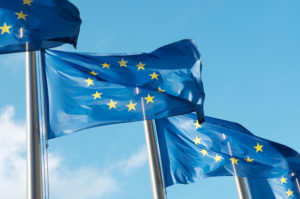Highlights from the Past Week
CW 2 / Monday, 10 to Thursday, 13 January: Political Group and Committee Meetings Week (Brussels);
DIGITAL SERVICES ACT – CONFIRMATION OF PARLIAMENT VOTE: This coming Wednesday, the debate on the DSA will take place in the (virtual) plenary of the European Parliament, and the vote will take place the following day. Numerous MEPs had already announced that they would table amendments. These concern in particular the topics of targeted advertising, interoperability, transparency of recommendation systems and a media exemption. A list of the initial ca. 70 amendments (in addition to the IMCO report) has in the meantime been published by the European Parliament.
DIGITAL MARKETS ACT – FIRST TRILOGUE ROUND: Last week, the starting signal was set for the negotiations on the DMA. Among others, those at the forefront of the round of opening statements were Vice-President M. Vestager and Commissioner Breton for the Commission, the French Digital Minister Cedric O for the Council and – it goes without saying – the rapporteur A. Schwab for the Parliament.
The Parliament and the Council will have to resolve several divergent views in the course of the negotiations, relating to obligations for gatekeepers, consequences for systematic non-compliance, information obligations on mergers, consumer protection and whistleblowers, governance and enforcement, and fines. (see 4-column document, PDF)
NIS2 – FIRST TRILOGUE ROUND: In contrast to the DMA’s rather formal trilogue opening, the NIS2 is getting straight down to business. The co-legislators have already been discussing the four contentious points: the scope (the most difficult part), the national security strategy, the timeline for reporting, and the peer-review process. The French are planning to close the file by April, with the possibility of the negotiations dragging into May. While less “spendable” in electoral terms, the pace of two technical meetings per week signals that Paris is seriously putting the file on its priority list. (see Euractiv)
The next political trilogue is scheduled for 17 February.
PRODUCT SECURITY – MARKETPLACES SHOULD REACT QUICKLY: The fact that legislators are demanding ever more extensive and increasingly quick reactions from Internet service providers is nothing new. Last week, the Greens (with K. van Sparrentak) and the Social Democrats (with C. Schaldemose) in the Internal Market Committee also accordingly spoke out on the subject of the Product Safety Directive: Online marketplaces should react to problematic products without unnecessary delays and within two or five days at the latest – depending on whether the notification comes from a market surveillance authority or from a user. (video)
POLITICAL ADS – COMMISSION DEFENDS TRANSPARENCY REQUIREMENT: The Commission defended its decision to focus on transparency in its latest rules on political ads, in order to combat online manipulation. In Europe, the German Greens are the biggest spenders on Google ads, with over 1 million Euro since 2019. (see Google Transparency Report – DE)
Maria Manuel Leitão Marques (S&D, PT), Pablo Arias Echeverría (EPP, ES), Alexandra Geese (Greens, DE), Stelios Kouloglou (Left, GR) and Kosma Złotowski (ECR, PL) will represent their parties in the negotiations in Parliament, led by Sandro Gozi (Renew, FR).
ARTIFICIAL INTELLIGENCE – EP NEGOTIATION TEAM IN PLACE: AIDA rapporteur A. Voss (EPP, DE) has already been appointed as shadow rapporteur for the AI Act in the Committee on Civil Liberties (LIBE). Now that the rapporteur in the Legal Affairs Committee (JURI) has also been announced, this is also clear: A. Voss will take on this role.
The JURI Committee has an exclusive say on articles concerning transparency and the provision of information to users, human oversight, transparency obligations for certain AI systems, and codes of conduct.
In the Industry Committee (ITRE), Eva Maydell (EPP, BG) will lead the work on the AI Act. The committee will get an exclusive say on the topics of accuracy, robustness and cybersecurity, as well as on measures for small-scale providers and users. The committee will also participate in negotiations on data governance, conformity, and how to define an AI system.
In the Culture Committee (CULT), Marcel Kolaja (Greens, CZ) will be responsible for leading the negotiations. The committee will help define AI systems.
The IMCO and LIBE Committees, which are jointly leading the negotiations on the AI Act, aim to present a first draft report by 5 April. Before that, a hearing is to take place on 16 March. The other committees are to submit their opinions on the draft act by 20 June. The IMCO-LIBE report is scheduled to be voted on on 29 September, and the whole Parliament will vote on the act on 9 November. (see Politico)
Already in September last year, the Environment Committee (ENVI) appointed its rapporteur. S. Solís Pérez (Renew, ES) presented her draft opinion (PDF) in committee last week. There she called for AI systems in the area of the environment – alongside health, safety, and the protection of fundamental rights – to be classified as high-risk AI. In the area of health, the AI regulation should also distinguish between users and recipients. (video)
ARTIFICIAL INTELLIGENCE – FRANCE PRESENTS FIRST COMPROMISE PROPOSAL: The French Presidency circulated its first compromise proposal for the AI Regulation among the Member States last week (PDF, FR). This concerns the requirements for AI systems with high risk (Articles 8 to 15 and Annex IV). Meanwhile, the Slovenian Presidency’s proposal already deals with Articles 1 to 7.
This recognises that training, validation and testing datasets can never be completely free of error, which stands in contrast to the Commission’s proposal. Therefore, the requirement is that they must be free of error “to the best extent possible”. The French compromise revises the technical documentation that must be provided for placing an AI system on the market for SMEs as well as start-ups, and clarifies that the documentation “equivalent” to that listed in Annex IV is sufficient. Finally, the text introduces new elements to the instructions for use, such as a description of the mechanism included in the AI system that allows users to correctly collect, store and interpret logs where appropriate. (see Contexte, paywall, FR or Euractiv)
The document will be discussed in the Telecom Working Party on 18 January.
COMPUTER CHIPS ACT – BRETON PROVIDES FURTHER INSIGHT: The future text on semiconductors will consist of three sections, Commissioner Breton told the press last week.
The first section will deal with research and will provide for the creation of an ad hoc platform and funding. The second section will support the creation of large factories in Europe that can produce components. The third piece of legislation, which is directly related to strategic autonomy, will deal with the raw materials needed for the development of semiconductors – whether they are manufactured in Europe, or whether the supply chain is secured.
The goal of future legislation is to quadruple the EU’s production capacity so that, by 2030, 20 per cent of the world’s semiconductors will come from Europe. Breton also wants to encourage the industry to work more on breakthrough technologies.
The draft text is very advanced, according to Thierry Breton, and he is aiming for publication between the end of January and mid-February. (see Contexte, paywall, FR)
MEDIA FREEDOM – COMMISSION ADDS QUESTIONNAIRE TO CONSULTATION: On Monday, the EU Commission added a questionnaire to its call for evidence for its impact assessment on safeguarding media freedom in the EU. The consultation, which is very much focused on traditional media, only deals marginally with technologies in point 3.4 (enabling an environment for innovative media). The consultation runs until 21 March.
WEB ANALYSIS – AUSTRIAN DATA PROTECTION AUTHORITY VS GOOGLE ANALYTICS: The Austrian data protection authority has upheld a complaint against a website which implemented the web analytics tools developed by Google, as this resulted in an illegal transfer of user data to the United States. The standard data protection clauses do not provide sufficient protection.
This is according to a ruling (PDF – DE) published last week, filed by the non-governmental organisation noyb.eu and led by privacy activist Max Schrems, against websites that use web analytics tools developed by Google and Facebook.
IRELAND – BILL AGAINST HARMFUL STREAMING CONTENT: The Irish government has unveiled a new bill to regulate harmful online content. The Online Safety and Media Regulation Bill will monitor streaming platforms and broadcasters and create a new Media Commission and an Online Safety Commissioner to enforce not only this legislation, but also what the government says is a “rolling package” of related legislation from Ireland and the EU.
The bill has parallels with measures in the DSA when it comes to moderating harmful online content, and is also similar to the UK’s Online Safety Bill. (see Euractiv)
FRANCE – CONTENT MODERATION RULES: An implementing decree (FR) on the scope of French content moderation legislation was published at the weekend as part of a broader text to combat radical Islam.
The rules will apply to platforms with more than 10 million monthly visitors, and the additional obligations for the largest companies will apply to those with at least 15 million monthly visitors. The deadline for the European Commission to comment expired last week, meaning the bill can now enter into force.
FRANCE – COLLECTING SOCIETY TAKES STREAMING AGREEMENT TO COURT: The powerful Society of Authors and Composers is taking the agreement between the audiovisual regulatory authority and streaming platforms such as Netflix, Amazon Prime and Disney+ to the French Council of State, France’s highest administrative court. The collecting society argues that the investment obligations set are too low. (see Romain Colas, Twitter or Politico Pro, paywall)
CONNECTING EUROPE FACILITY – CALL FOR PROPOSALS: With a budget of 258 million Euro, the EU Commission wants to improve the EU’s infrastructures for digital connectivity – especially Gigabit and 5G networks – within the framework of the “Connecting Europe Facility” (CEF Digital) programme. To this end, it has published the first calls for proposals. (see press release COM)
RIGHT TO REPAIR – COMMISSION LAUNCHES CONSULTATION: The European Commission has launched a public consultation on sustainable consumption of goods. Interested parties can express their views until 5 April 2022. The consultation takes place in the framework of the legislative initiative on the right to repair announced in the Commission’s Work Programme for 2022. (see press release COM)
CHINA – STANDARDISATION OF RECOMMENDATION ALGORITHMS: In early January, China’s central cyberspace affairs commission finalised a new regulation (CN, EN) that aims to standardise recommendation algorithms, “safeguard national security and social public interests”, and protect citizens. Politico Pro (paywall) quotes Kendra Schaefer of Trivium China, a policy research company, citing her assessment that it is the “world’s most groundbreaking regulation on algorithms”. The regulation will enter into force in March.
Relevant Publications, including from the EP Think Tank:
Outlook for the Coming Week
You can find a list of the upcoming dates of the European Parliament here and an overview of the agendas of the plenary sessions week here. The provisional meeting calendar for 2022 can be found here (PDF).
For the coming week, not only are the elections for the new president and the vice-presidents scheduled, but also the vote for the Digital Services Act. On Wednesday, the debates will take place, with the vote scheduled for Thursday.
An overview of the most important dates of the Council week can be found here, the meeting calendar is accessible here, and the list of the main topics for the coming 14 days is available here, while an indicative calendar of meetings of the French Presidency of the Council of the European Union can be found here (PDF).
Included among these dates are:
Summit and Ministry Meetings:
- Agriculture and Fisheries Council, Monday, 17 January – Agenda, A Items, A Items Addition 1
- Economic and Financial Affairs Council (incl. OECD Tax, French Council Presidency, German G7 Presidency), Tuesday, 18 January – Agenda, A Items;
- Informal Meetings of Environment and Energy Ministers, Thursday, 20 to Saturday, 22 January;
Preparatory Bodies:
- Audiovisual Working Party, Monday, 17 January;
- Working Party on Competition, Monday, 17 January and Thursday, 20 January;
- Working Party on Telecommunications and Information Society, Tuesday, 18 January;
- Working Party on Competitiveness and Growth (Industry), Thursday, 20 January;
- Working Party on Cooperation in Criminal Matters (COPEN), Wednesday, 19 January and Thursday, 20 January;
- Working Party on Tax Questions (Direct Taxation), Thursday, 20 January;
- Working Party on Intellectual Property, Thursday, 20 January;
- Working Party on Intellectual Property (Copyright), Thursday, 20 January;
- Working Party on Consumer Protection and Information, Tuesday, 18 January and Thursday, 20 January;
- Horizontal Working Party on Cyber Issues (incl. NIS2), Tuesday, 18 January and Friday, 21 January;
- COREPER I (incl. NIS2), Wednesday, 19 January;
- COREPER II, Friday, 21 January;
Information about the weekly Commission meeting can be found in the preview (PDF) or (at short notice) in the current agenda. Topics of particular relevance include the Data Act (23 February), the legislative proposal for combatting child abuse (2 March), and the Media Freedom Act (29 June). Internal Market Commissioner Breton recently underlined the hope of being able to present the Chips Act as early as the beginning of 2022.
The following topics are on the agenda for the coming week:
- Higher education package
- European strategy for universities
- Building bridges for effective higher education cooperation
You can find the judicial calendar of the ECJ here.
European Parliament Committees
CW 3 / Monday, 17 to Thursday, 20 January: Plenary Sessions Week (Strasbourg);
LIBE Committee (EP)
Current Meetings
- None
Further Meetings (Calendar)
- Wednesday, 26 January 2022, 9.00-12.00 (Brussels)
- Monday, 31 January 2022, 15.45-18.45 (Brussels)
JURI Committee (EP)
Current Meetings
- None
Further Meetings
- Wednesday, 26 January 2022 (Brussels)
- Thursday, 27 January 2022 (Brussels)
Dossiers Timetable (21 December 2021)
ITRE Committee (EP)
Current Meetings
- None
Further Meetings (Calendar)
- Wednesday, 26 January 2022, 9.00-12.00, 13.45-15.45 and 16.45-18.45 (Brussels)
- Thursday, 27 January 2022, 9.00-12.00 (Brussels)
Dossiers Timetable (7 December 2021)
IMCO Committee (EP)
Current Meetings
- None
Further Meetings (Calendar)
- Monday, 24 January 2022, 13.45-16.15 and 16.45-18.45 (Brussels)
Dossiers Timetable (January 2022)
CULT Committee (EP)
Current Meetings
- None
Further Meetings (Calendar)
- Wednesday, 26 or Thursday, 27 January 2022 (Brussels)
AIDA Committee (EP) – Special Committee on Artificial Intelligence in a Digital Age
Current Meetings
- None
Further Meetings (Calendar)
- Thursday, 10 February 2022, 9.00-12.00 (Brussels)
INGE (EP) – Special Committee on Foreign Interference in all Democratic Processes in the European Union, including Disinformation
Current Meetings
- None
Further Meetings (Calendar)
- Tuesday, 25 January 2022, 9.00-12.00 (Brussels)
Further Scheduled Parliamentary Calendar Dates
- CW 4 / Monday, 24 to Thursday, 27 January: Mini Plenary Sessions Week (Brussels);
- CW 5 / Monday, 31 January to Thursday, 3 February: Committee Meetings Week (Brussels);
- CW 6 / Monday, 7 to Thursday, 10 February: Political Group and Committee Meetings Week (Brussels);




